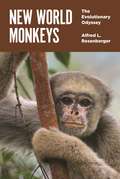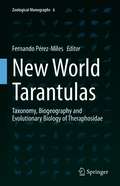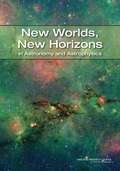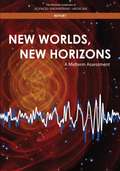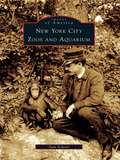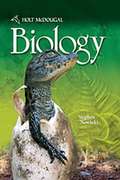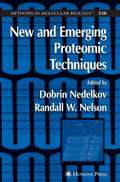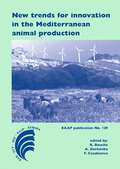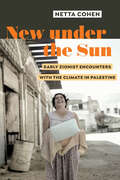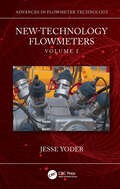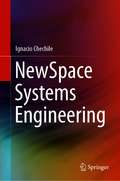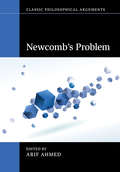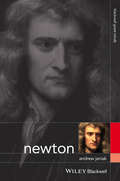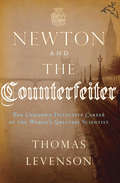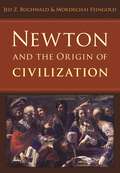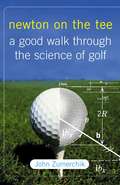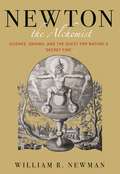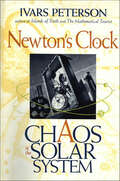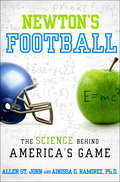- Table View
- List View
New World Monkeys: The Evolutionary Odyssey
by Alfred L. RosenbergerA comprehensive account of the origins, evolution, and behavior of South and Central American primatesNew World Monkeys brings to life the beauty of evolution and biodiversity in action among South and Central American primates, who are now at risk. These tree-dwelling rainforest inhabitants display an unparalleled variety in size, shape, hands, feet, tails, brains, locomotion, feeding, social systems, forms of communication, and mating strategies. Primatologist Alfred Rosenberger, one of the foremost experts on these mammals, explains their fascinating adaptations and how they came about.New World Monkeys provides a dramatic picture of the sixteen living genera of New World monkeys and a fossil record that shows that their ancestors have lived in the same ecological niches for up to 20 million years—only to now find themselves imperiled by the extinction crisis. Rosenberger also challenges the argument that these primates originally came to South America from Africa by floating across the Atlantic on a raft of vegetation some 45 million years ago. He explains that they are more likely to have crossed via a land bridge that once connected Western Europe and Canada at a time when many tropical mammals transferred between the northern continents.Based on the most current findings, New World Monkeys offers the first synthesis of decades of fieldwork and laboratory and museum research conducted by hundreds of scientists.
New World Tarantulas: Taxonomy, Biogeography and Evolutionary Biology of Theraphosidae (Zoological Monographs #6)
by Fernando Pérez-MilesThe Theraphosidae are the most famous and diverse mygalomorph spiders, and include some of the largest arachnids on earth. Their unique defense mechanisms, predatory tactics, reproductive strategies and ecological adaptations are displayed by a wide range of terrestrial, burrowing and arboreal species. These arachnids are familiar to the general public thanks to horror movies and a growing interest in tarantulas as pets; however, scientific information on the group is scattered throughout the literature and not easily available. This book reviews all major aspects of New World Theraphosid tarantulas and provides in-depth information on their evolution, taxonomy, behavior, physiology, ecology, reproduction, conservation and biogeography. As a comprehensive guide to the biology of tarantulas, it will appeal to researchers, students and terrarium hobbyists alike.
New Worlds, New Horizons in Astronomy and Astrophysics
by National Research Council of the National AcademiesDriven by discoveries, and enabled by leaps in technology and imagination, our understanding of the universe has changed dramatically over the course of the last few decades. The fields of astronomy and astrophysics are making new connections to physics, chemistry, biology, and computer science. Based on a broad and comprehensive survey of scientific opportunities, infrastructure, and organization in a national and international context, New Worlds, New Horizons in Astronomy and Astrophysics outlines a plan for ground- and space- based astronomy and astrophysics for the decade of the 2010's. Realizing these scientific opportunities is contingent upon maintaining and strengthening the foundations of the research enterprise including technological development, theory, computation and data handling, laboratory experiments, and human resources. New Worlds, New Horizons in Astronomy and Astrophysics proposes enhancing innovative but moderate-cost programs in space and on the ground that will enable the community to respond rapidly and flexibly to new scientific discoveries. The book recommends beginning construction on survey telescopes in space and on the ground to investigate the nature of dark energy, as well as the next generation of large ground-based giant optical telescopes and a new class of space-based gravitational observatory to observe the merging of distant black holes and precisely test theories of gravity. New Worlds, New Horizons in Astronomy and Astrophysics recommends a balanced and executable program that will support research surrounding the most profound questions about the cosmos. The discoveries ahead will facilitate the search for habitable planets, shed light on dark energy and dark matter, and aid our understanding of the history of the universe and how the earliest stars and galaxies formed. The book is a useful resource for agencies supporting the field of astronomy and astrophysics, the Congressional committees with jurisdiction over those agencies, the scientific community, and the public.
New Worlds, New Horizons: A Midterm Assessment
by Engineering Medicine National Academies of SciencesNew Worlds, New Horizons in Astronomy and Astrophysics (NWNH), the report of the 2010 decadal survey of astronomy and astrophysics, put forward a vision for a decade of transformative exploration at the frontiers of astrophysics. This vision included mapping the first stars and galaxies as they emerge from the collapse of dark matter and cold clumps of hydrogen, finding new worlds in a startlingly diverse population of extrasolar planets, and exploiting the vastness and extreme conditions of the universe to reveal new information about the fundamental laws of nature. NWNH outlined a compelling program for understanding the cosmic order and for opening new fields of inquiry through the discovery areas of gravitational waves, time-domain astronomy, and habitable planets. Many of these discoveries are likely to be enabled by cyber-discovery and the power of mathematics, physics, and imagination. To help realize this vision, NWNH recommended a suite of innovative and powerful facilities, along with balanced, strong support for the scientific community engaged in theory, data analysis, technology development, and measurements with existing and new instrumentation. Already in the first half of the decade, scientists and teams of scientists working with these cutting-edge instruments and with new capabilities in data collection and analysis have made spectacular discoveries that advance the NWNH vision. New Worlds, New Horizons: A Midterm Assessment reviews the responses of NASA’s Astrophysics program, NSF’s Astronomy program, and DOE’s Cosmic Frontiers program to NWNH. This report describes the most significant scientific discoveries, technical advances, and relevant programmatic changes in astronomy and astrophysics over the years since the publication of the decadal survey, and assesses how well the Agencies’ programs address the strategies, goals, and priorities outlined in the 2010 decadal survey.
New York Chemistry: Matter and Change
by Mcgraw-Hill GlencoeNew York Chemistry: Matter and Change is a comprehensive course of study designed for a first-year high school chemistry curriculum, this program incorporates features for strong math support and problem-solving development. New features include content organized around Themes, Big Ideas, and Main Ideas, promoting student comprehension and testing success; more assessment options than ever; Dinah Zike's FOLDABLES, three-dimensional graphic organizers that help students grasp information for review and retention; the latest in Glencoe classroom technology, and much more!
New York City Zoos and Aquarium (Images of America)
by Joan ScheierSituated within the five boroughs of New York City are five zoos and one aquarium. New York City Zoos and Aquarium chronicles the establishment of the Central Park Zoo, the Bronx Zoo, the Prospect Park Zoo, the Queens Zoo, the Staten Island Zoo, and the New York Aquarium. Popular children's zoos are also featured. The city's first zoo opened in Central Park in the 1850s, while the newest zoo opened in Queens after the 1964 World's Fair. While each one of these facilities has many similarities, they all have their own unique attributes. All of the facilities are focused on education, conservation, and the care of the animals that now reside in natural habitats.
New York Living Environment Regents Exam Review Guide
by Mcdougal LittellExam prep for The Living Environment Regents Examination
New York Living Environment Regents Exam Review Guide
by Mcdougal-Littell Publishing StaffNIMAC-sourced textbook
New Zealand Freshwater Fishes
by R. M. McdowallThis book provides a synthesis of taxonomic and ecological information on New Zealand's freshwater fish fauna. New Zealand has been isolated in the southwestern Pacific Ocean since it separated from Gondwana during the Cretaceous period, some 80 million years ago. This prolonged geological isolation, combined with the islands' very vigorous geological history, impacted by oceanic submergence, tectonic activity, mountain building extreme volcanism, and great climatic variability, create a dynamic scenario within which the New Zealand biota, including its freshwater fishes, have evolved over millions of years. These impacts have contributed to a highly dynamic biological history with undoubted though little understood extinction and vigorous colonisation of the islands' fresh water. One of the key elements for understanding the origins and derivations of this fish fauna is that in all groups some or all of the species are diadromous, customarily spending a significant phase of their lives at sea. This has no doubt contributed in an important way the fauna's origins As well, there has been frequent loss of diadromous behaviours leading, to species that have abandoned their sea-migratory behaviours and which now complete their entire lives in fresh water. The distribution patterns reflect these changing habits, with diadromous species being broadly distributed but tending to be lowland in range, whereas the derived, non-diadromous species have narrower ranges, but are often found further inland and at high elevations. This book provides an ecological and historical synthesis of these divergent patterns across New Zealand's geography and history.
New Zealand Lizards
by David G. ChappleThis edited volume is a timely and comprehensive summary of the New Zealand lizard fauna. Nestled in the south-west Pacific, New Zealand is a large archipelago that displays the faunal signatures of both its Gondwanan origins, and more recent oceanic island influences. New Zealand was one of the last countries on Earth to be discovered, and likewise, the full extent of the faunal diversity present within the archipelago is only just starting to be appreciated. This is no better exemplified than in lizards, where just 30 species (20 skinks, 10 geckos) were recognized in the 1950s, but now 104 are formally or informally recognized (61 skinks, 43 geckos). Thus, New Zealand contains one of the most diverse lizard faunas of any cool, temperate region on Earth. This book brings together the world's leading experts in the field to produce an authoritative overview of the history, taxonomy, biogeography, ecology, life-history, physiology and conservation of New Zealand lizards.
New and Emerging Proteomic Techniques
by Dobrin Nedelkov Randall W. NelsonLeading researchers and innovators describe in step-by-step detail the latest techniques that promise to significantly impact the practice of proteomics, as well as its success in developing novel clinical agents. The methods span the entire spectrum of top-down and bottom-up approaches, including microarrays, gels, chromatography, and affinity separations, and address every aspect of the human proteome, both quantitatively and qualitatively. The techniques of protein detection utilized are diverse and range from fluorescence and resonance light scattering to surface plasmon resonance and mass spectrometry. The protocols follow the successful Methods in Molecular BiologyTM series format, each offering step-by-step laboratory instructions, an introduction outlining the principles behind the technique, lists of the necessary equipment and reagents, and tips on troubleshooting and avoiding known pitfalls.
New and Future Development in Biopesticide Research: Biotechnological Exploration
by Surajit De Mandal Fengliang Jin G. Ramkumar S. KarthiThis book discusses different approaches for successful pest-management through biotechnological interventions. Pest management is directly associated with the agricultural productivity. The book introduces the reader to various kinds of biopesticides that have been developed and are being developed for field application. Chemical pesticides have been widely used to control pests, and these induce pesticide resistance as well as other environmental problems. This book discusses the necessity to develop alternate pest control strategies, especially environment-friendly and target-specific biopesticides against destructive pests. The book describes important aspects such as microbial biopesticides, plant-based biopesticides, natural products that act against pests and the various other biotechnological advances and limitations of these biopesticides. It provides an in-depth knowledge of the latest research and development in the area of biopesticides. This informative book is meant for students and researchers in the fields of biotechnology, agriculture and applied microbiology.
New trends for innovation in the Mediterranean animal production
by A. Derkimba F. Casabianca R. BoucheThe Mediterranean area shows a great diversity of livestock systems, depending on local resources and traditions, but also on the networking space where informational resources are available for producers. During the last decades, a lot of innovations have been conceived or introduced in the Mediterranean area, allowing livestock systems to remain competitive. The book looks at two main issues: firstly, it gives an updated review on the main innovations that significantly changed the activities of livestock production in the Mediterranean area in the recent past. Secondly, the focus lies on the extent to which these innovations improve the efficiency, ensure the socio-cultural basis or reduce the environmental impact of livestock systems. One major finding is a new vision of innovating systems based on the distinction between regulated innovation (when aims are fixed) and innovative design (when aims are questioned). Innovations reported in the book are dealing with a set of concerns. They concern the production techniques, the work organization, the equipment and infrastructures, the collective features for selection, reproduction, feeding or sanitary devices. They also concern the local organization such as product labelling, new dynamics around local breeds, collective rules for supply basin or approaches of new products for new markets. More recently, some innovations focus on environmental impacts of livestock production, due to an increasing consciousness of those kinds of problems. In the final part of the book, a round table copes with a crucial question: are traditions in Mediterranean livestock activities to be considered an obstacle or a source of innovation? This book provides a set of updated information and knowledge useful for researchers, students, extension services and policy-makers in the field of animal science.
New under the Sun: Early Zionist Encounters with the Climate in Palestine
by Dr. Netta CohenNew under the Sun explores Zionist perceptions of—and responses to—Palestine’s climate. From the rise of the Zionist movement in the late 1890s to the establishment of the State of Israel in 1948, Netta Cohen traces the production of climactic knowledge through a rich archive that draws from medicine and botany, technology and economics, and architecture and planning. As Cohen convincingly argues, this knowledge was not only shaped by Jewish settlers’ Eurocentric views but was also indebted to colonial practices and institutions. Zionists’ claims to the land were often based on the construction of Jewish settlers as natives, even while this was complicated by their alienated responses to Palestine’s climate. New under the Sun offers a highly original environmental lens on the ways in which Zionism’s spatial ambitions and racial fantasies transformed the lives of humans and nonhumans in Palestine.
New-Technology Flowmeters: Volume I
by Jesse YoderNew-Technology Flowmeters describes the origin, principle of operation, development, advantages and disadvantages, applications, and frontiers of research for new-technology flowmeters, which include Coriolis, magnetic, ultrasonic, vortex, and thermal. Focusing on the newer, faster growing flowmeter markets, the book places them in the context of more traditional meters such as differential pressure, turbine, and positive displacement. Taking an objective look at the origins of each flowmeter type, the book discusses the early patents, for each type, and which companies deserve credit for initially commercializing each flowmeter type. This book is designed for personnel involved with flowmeters and instrumentation, including product and marketing managers, strategic planners, application engineers, and distributors.
NewSpace Systems Engineering
by Ignacio ChechileThis book provides a guide to engineering successful and reliable products for the NewSpace industry. By discussing both the challenges involved in designing technical artefacts, and the challenges of growing an organisation, the book presents a unique approach to the topic.New Space Systems Engineering explores numerous difficulties encountered when designing a space system from scratch on limited budgets, non-existing processes, and great deal of organizational fluidity and emergence. It combines technical topics related to design, such as system requirements, modular architectures, and system integration, with topics related to organizational design, complexity, systems thinking, design thinking and a model based systems engineering. Its integrated approach mean this book will be of interest to researchers, engineers, investors, and early-stage space companies alike. It will help New Space founders and professionals develop their technologies and business practices, leading to more robust companies and engineering development.
Newcomb's Problem (Classic Philosophical Arguments)
by Arif AhmedNewcomb's problem is a controversial paradox of decision theory. It is easily explained and easily understood, and there is a strong chance that most of us have actually faced it in some form or other. And yet it has proven as thorny and intractable a puzzle as much older and better-known philosophical problems of consciousness, scepticism and fatalism. It brings into very sharp and focused disagreement several long-standing philosophical theories on practical rationality, on the nature of free will, and on the direction and analysis of causation. This volume introduces readers to the nature of Newcomb's problem, and ten chapters by leading scholars present the most recent debates around the problem and analyse its ramifications for decision theory, metaphysics, philosophical psychology and political science. Their chapters highlight the status of Newcomb's problem as a live and continuing issue in modern philosophy.
Newton
by Andrew JaniakNewton is an evocative intellectual history of the life and ideas of Isaac Newton the natural philosopher, covering his influential thoughts about philosophical problems, our knowledge of nature, and even the nature of the divine. Offers a comprehensive and highly accessible introduction to the life and ideas of Isaac Newton, emphasizing his influential contributions to the field of philosophy Covers the principal philosophical topics that captivated Newton's mind, from our knowledge of nature to the nature of the divine Includes the most recent and innovative research regarding Newton's views on theology and philosophy Emphasizes the philosophical importance of Newton's work to the history of philosophy and his engagement with the ideas of both historic and contemporary figures such as Galileo and Descartes, Leibniz and Locke
Newton and the Counterfeiter: The Unknown Detective Career of the World's Greatest Scientist
by Thomas LevensonA &“thoroughly surprising&” chapter in the life of Isaac Newton, with a &“vivid re-creation of 17th-century London and its fascinating criminal haunts&” (Providence Journal). When renowned scientist Isaac Newton takes up the post of Warden of His Majesty&’s Mint in London, another kind of genius—a preternaturally gifted counterfeiter named William Chaloner—has already taken up residence in the city, rising quickly in an unruly, competitive underworld. In the courts and streets of London, and amid the tremors of a world being transformed by ideas Newton himself set in motion, Chaloner crosses paths with the formidable new warden. An epic game of cat and mouse ensues in Newton and the Counterfeiter, revealing for the first time the &“remarkable and true tale of the only criminal investigator who was far, far brainier than even Sherlock Holmes: Sir Isaac Newton during his tenure as Warden of the Royal Mint . . . A fascinating saga&” (Walter Isaacson). &“I absolutely loved Newton and the Counterfeiter. Deft, witty and exhaustively researched.&” —Junot Díaz, author of The Brief Wondrous Life of Oscar Wao &“A delicious read, featuring brilliant detective work and a captivating story . . . A virtuoso performance.&” —Sylvia Nasar, author of A Beautiful Mind &“Through a page-turning narrative, we witness Isaac Newton&’s genius grappling with the darker sides of human nature, an all too human journey reflecting his deepest beliefs about the cosmic order.&” —Brian Greene, author of The Fabric of the Cosmos &“Levenson transforms inflation and metallurgy into a suspenseful detective story bolstered by an eloquent summary of Newtonian physics and stomach-turning descriptions of prison life in the Tower of London. . . . [The book] humanizes a legend, transforming him into a Sherlock Holmes in pursuit of his own private Moriarty.&” —The Washington Post
Newton and the Origin of Civilization
by Jed Z. Buchwald Mordechai FeingoldIsaac Newton's Chronology of Ancient Kingdoms Amended, published in 1728, one year after the great man's death, unleashed a storm of controversy. And for good reason. The book presents a drastically revised timeline for ancient civilizations, contracting Greek history by five hundred years and Egypt's by a millennium. Newton and the Origin of Civilization tells the story of how one of the most celebrated figures in the history of mathematics, optics, and mechanics came to apply his unique ways of thinking to problems of history, theology, and mythology, and of how his radical ideas produced an uproar that reverberated in Europe's learned circles throughout the eighteenth century and beyond. Jed Buchwald and Mordechai Feingold reveal the manner in which Newton strove for nearly half a century to rectify universal history by reading ancient texts through the lens of astronomy, and to create a tight theoretical system for interpreting the evolution of civilization on the basis of population dynamics. It was during Newton's earliest years at Cambridge that he developed the core of his singular method for generating and working with trustworthy knowledge, which he applied to his study of the past with the same rigor he brought to his work in physics and mathematics. Drawing extensively on Newton's unpublished papers and a host of other primary sources, Buchwald and Feingold reconcile Isaac Newton the rational scientist with Newton the natural philosopher, alchemist, theologian, and chronologist of ancient history.
Newton on the Tee
by John ZumerchikLike no other sport, golf obsesses those poor souls who hope to master its subtleties and abundant complexities. One shot is hit like a dream, the next a nightmare. As a result, the game's disciples have embraced any and all techniques endorsed by pros and hackers, poets and philosophers (these days a good walk is often spoiled by tripping over a sandtrap's worth of Zen meditations and mystical tomes). But while so many have journeyed through golf's metaphysics, no one has presented a readable, compelling look at the science of the game -- until now. In Newton on the Tee, accomplished science writer John Zumerchik examines, explores, and explains to us the endless details that make golf such a tantalizing pursuit. Written in language accessible to even the most scientifically disinclined, Zumerchik's book delves into areas of supreme importance to every golfer, including: The Physics of the Sweet Swing: The universal principles shared by all those rhythmic and well-timed swings you see on TV but not in the mirror Mind Over Muscle: How the brain affects and controls the movements of the body (and why confidence is the golfer's most indispensable tool) Getting the Ball from Here to There: Decoding the vagaries of launch angles, spin, lift, and gravity that make the difference between walking happily down the fairway and tramping into the bunkers Probability and Statistics: Understanding the mathematics of golf, and a by-the-numbers appraisal of golf's greatest legends With a firm grasp of both his subject and his 7-iron, Zumerchik takes the reader through all these topics and more, in an entertaining and enlightening work that will give every golfer something to chew on besides his or her nails, and make clear and comprehensible the hundred-and-thirty-five things you shouldn't think about during your backswing.
Newton the Alchemist: Science, Enigma, and the Quest for Nature's "Secret Fire"
by William NewmanA book that finally demystifies Newton’s experiments in alchemyWhen Isaac Newton’s alchemical papers surfaced at a Sotheby’s auction in 1936, the quantity and seeming incoherence of the manuscripts were shocking. No longer the exemplar of Enlightenment rationality, the legendary physicist suddenly became “the last of the magicians.” Newton the Alchemist unlocks the secrets of Newton’s alchemical quest, providing a radically new understanding of the uncommon genius who probed nature at its deepest levels in pursuit of empirical knowledge.In this evocative and superbly written book, William Newman blends in-depth analysis of newly available texts with laboratory replications of Newton’s actual experiments in alchemy. He does not justify Newton’s alchemical research as part of a religious search for God in the physical world, nor does he argue that Newton studied alchemy to learn about gravitational attraction. Newman traces the evolution of Newton’s alchemical ideas and practices over a span of more than three decades, showing how they proved fruitful in diverse scientific fields. A precise experimenter in the realm of “chymistry,” Newton put the riddles of alchemy to the test in his lab. He also used ideas drawn from the alchemical texts to great effect in his optical experimentation. In his hands, alchemy was a tool for attaining the material benefits associated with the philosopher’s stone and an instrument for acquiring scientific knowledge of the most sophisticated kind.Newton the Alchemist provides rare insights into a man who was neither Enlightenment rationalist nor irrational magus, but rather an alchemist who sought through experiment and empiricism to alter nature at its very heart.
Newton's Apple and Other Myths about Science
by Ronald L. NumbersA falling apple inspired the law of gravity--or so the story goes. Is it true? Perhaps not. But why do such stories endure as explanations of how science happens? Newton's Apple and Other Myths about Science brushes away popular misconceptions to provide a clearer picture of scientific breakthroughs from ancient times to the present.
Newton's Clock: Chaos in the Solar System
by Ivars PetersonWith his critically acclaimed best-sellers The Mathematical Toursist and Islands of Truth, Ivars Peterson took readers to the frontiers of modern mathematics. His new book provides an up-to-date look at one of science's greatest detective stories: the search for order in the workings of the solar system.In the late 1600s, Sir Isaac Newton provided what astronomers had long sought: a seemingly reliable way of calculating planetary orbits and positions. Newton's laws of motion and his coherent, mathematical view of the universe dominated scientific discourse for centuries. At the same time, observers recorded subtle, unexpected movements of the planets and other bodies, suggesting that the solar system is not as placid and predictable as its venerable clockwork image suggests.Today, scientists can go beyond the hand calculations, mathematical tables, and massive observational logs that limited the explorations of Newton, Copernicus, Galileo, Kepler, Tycho Brahe, and others. Using supercomputers to simulate the dynamics of the solar system, modern astronomers are learning more about the motions they observe and uncovering some astonishing examples of chaotic behavior in the heavens. Nonetheless, the long-term stability of the solar system remains a perplexing, unsolved issue, with each step toward its resolution exposing additional uncertainties and deeper mysteries.To show how our view of the solar system has changed from clocklike precision to chaos and complexity, Newton's Clock describes the development of celestial mechanics through the ages--from the star charts of ancient navigators to the seminal discoveries of the 17th centure; from the crucial work of Poincaré to the startling, sometimes controversial findings and theories made possible by modern mathematics and computer simulations. The result makes for entertaining and provocative reading, equal parts science, history, and intellectual adventure.
Newton's Football
by Allen St. John Ainissa G. RamirezIn the bestselling tradition of Freakonomics and Scorecasting comes a clever and accessible look at the big ideas underlying the science of football. Did you hear the one about the MacArthur genius physicist and the NFL coach? It's not a joke. It's actually an innovative way to understand chaos theory, and the remarkable complexity of modern professional football. In Newton's Football, journalist and New York Times bestselling author Allen St. John and TED Speaker and former Yale professor Ainissa Ramirez explore the unexpected science behind America's Game. Whether it's Jerry Rice finding the common ground between quantum physics and the West Coast offense or an Ivy League biologist explaining--at a granular level--exactly how a Big Mac morphs into an outside linebacker, Newton's Football illuminates football--and science--through funny, insightful stories told by some of the world's sharpest minds. With a clear-eyed empirical approach--and an exuberant affection for the game--St. John and Ramirez address topics that have long beguiled scientists and football fans alike, including: * the unlikely evolution of the football (or, as they put it, "The Divinely Random Bounce of the Prolate Spheroid") * what Vince Lombardi has in common with Isaac Newton * how the hardwired behavior of monkeys can explain a head coach's reluctance to go for it on fourth-down * why a gruesome elevator accident jump-started the evolution of placekicking * how Teddy Roosevelt saved football using the same behavioral science concept that Dreamworks would use to save Shrek * why woodpeckers don't get concussions * how better helmets actually made the game more dangerous Every Sunday the NFL shares a secret with only its savviest fans: The game isn't just a clash of bodies, it's a clash of ideas. The greatest minds in football have always possessed an instinctual grasp of science, understanding the big ideas and gritty realities that inform the game's rich past, as well as its increasingly uncertain future. Blending smart reporting, counterintuitive creativity, and compelling narrative, Newton's Football takes gridiron analysis to the next level, giving fans a book that entertains, enlightens, and explains the game anew.Advance praise for Newton's Football "It was with great interest that I read Newton's Football. I'm a fan of applying of science to sport and Newton's Football truly delivers. The stories are as engaging as they are informative. This is a great read for all football fans."--Mark Cuban"Equal parts Isaac Newton and Cam Newton, this book is as thoroughly entertaining and engrossing as a fall Sunday afternoon on the couch."--L. Jon Wertheim, executive editor of Sports Illustrated and bestselling co-author of Scorecasting "Nothing is more bipartisan than America's love for football. And Newton's Football will unite readers of all stripes by merging science and sports in a fresh and fascinating fashion. Read this book and you'll never again watch a game the same way."--Chris Mooney, New York Times bestselling author of The Republican War on Science"A fascinating melding of science and sport, at once lively and illuminating, rich with knowledge of the game and arresting explanations of its winning strategies."--Daniel J. Kevles, Yale UniversityFrom the Hardcover edition.
